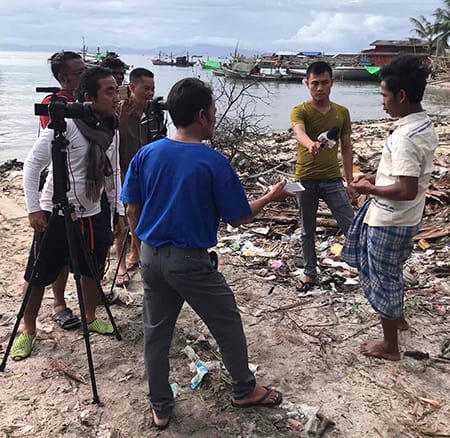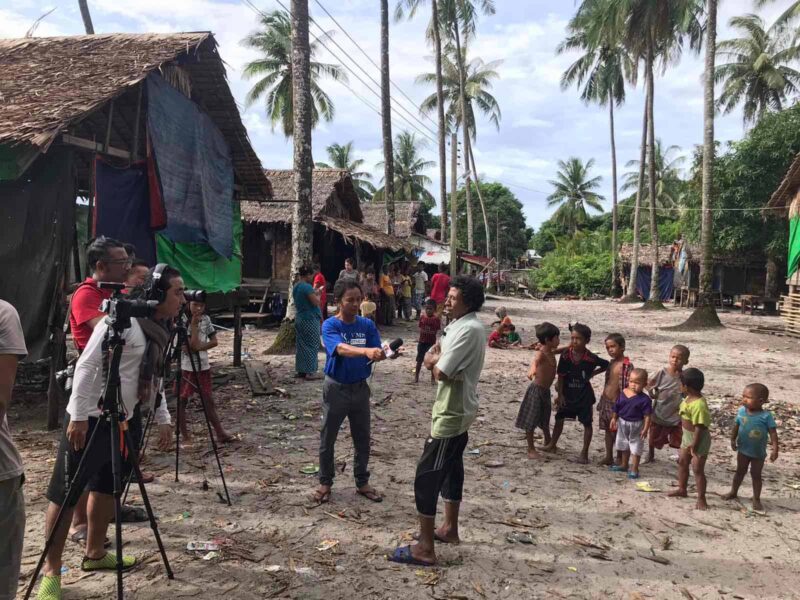It has been a few weeks since Yangon turned into a scarlet desert. Waving from balconies, taxi cabs and rickshaws, the red flags of the National League for Democracy (NLD) – Myanmar’s ruling party – enliven the empty streets of the commercial capital, thrown into lockdown once again as COVID-19 cases rise.
With the election just a few days away, the local and international spotlight is on the existing government’s management of this second wave, a change in tone from the resilience the nation showed to the virus when the pandemic was announced back in March. There is widespread fear that the recent renewal of restrictions on movement and travel might be leveraged by government authorities to tighten their grip on power, further hindering the already narrow room to maneuver of non-state actors like the media. Safeguarding and enhancing the integrity of Myanmar’s Rule of Law has never been more vital.
In a recently aired electoral speech, Aung San Suu Kyi, leader of the NLD, swore to turn the country into a “beautiful, thriving and safe garden,” saying that for too long it has not been sufficiently nurtured, littered with “pits and hollows, futile trees and broken fences, a casualty of bad weather.” The metaphor is clear: Myanmar is scarred from a history of political corruption, constitutional and judicial flaws, and media oppression, all serving to thwart the nation’s democratic ambitions. The “Lady of Yangon” preached sustainable development, peace and the establishment of a democratic federal union – all well-meaning promises, but ones that the Myanmar people have heard before.
Upcoming elections raise concerns for press freedom
The last two decades have marked immense change in Myanmar’s social, economic and political landscape following the rise to power of the NLD party in 2015. This opening up helped Internews work with local media and civil society to raise public awareness and improve the effectiveness of Rule of Law in the country; what COVID-19 and the upcoming elections have highlighted is that our work is far from over.
In September 2020, under new pandemic-related restrictions, Myanmar authorities excluded media and journalists from the list of businesses whose staff and contractors are allowed to travel or commute, severely impacting the operational capacity of dozens of media outlets, especially those based in Yangon. On top of this, the ease with which journalists and media outlets can be prosecuted has increased, while on-the-ground reporting has been choked, even banned in the most virus-affected areas. Several national newspapers and publications, including the Myanmar Times, the 7 Day Daily, the Voice Daily and the Frontier Myanmar have suspended printing.
As Phyu Phyu Zin, Program and Communication Officer for the Myanmar Center for Responsible Business (MCRB), highlights, the “media have a vital role in awareness-raising and advocacy [regarding Rule-of-Law]. Investigative reporting is key as well. In our country, most journalists don’t get proper professional training.”
Strengthening journalists investigative reporting skills

To this end, the Internews team has been working under the USAID-funded project “Promoting the Rule of Law in Myanmar” (PRLM), since October 2018. The major aim of PRLM is to strengthen ties between civil society and the media, while stimulating the national discussion on how to enhance the legitimacy and accountability of the country’s legal code. By contributing to fueling such a thorny discussion, the project has been encouraging key actors to engage constructively with each other, while guiding them in the design and production of content for national and regional broadcast and digital platforms.
Over the course of the last two years, the USAID PRLM project has promoted a series of roundtables focused on the major challenges to Rule of Law in Myanmar, facilitated in-house mentoring for journalists from regional and ethnic newsrooms, and deployed a story-production fellowship program to encourage editors and journalists to conduct in-depth narratives via on-the-ground reporting. A total of 76 media houses have been provided with technical assistance so far and 320 Rule of Law-related stories have been produced by participating journalists in national, regional and ethnic media outlets.
Addressing Rule of Law challenges arising from COVID-19
In addition to continuing its regular programming to support quality, critical media content and safe access to information, the PRLM team has pivoted to shed light on the fresh judicial and societal issues that have arisen amidst the pandemic. In late April, the team arranged an online discussion on the potential Rule of Law challenges that might arise in tandem with a surge of COVID-19 cases, involving CSOs and media outlets from six different regions. According to Thwin Linn Aung, Director at Genuine Public Servants, it was a “space where journalists could hear different views on the fighting strategies against COVID-19 from the rule of laws perspective. They could know more and they could expand these opinions to the public through the respective media. These initiatives contribute to enhancing the condition of the rule of law in Myanmar.”
One topic of concern that emerged from the debate centered on a lack of appropriate communication from the government to the people regarding preventive COVID-19 guidelines to follow. Kachin-based news outlet 74 Media highlighted this in mid-July. Junior Editor Zaw Ring Hpra, under the Individual Fellowship Program, produced an in-depth video story emphasizing how the authorities’ poor instructions on how to adhere to COVID-19 measures led to the filing of over one hundred cases of alleged violation of curfew and street market rules in Myitkyina. Meanwhile, Htet Phyo, a journalist for Monywa Gazette, a Sagaing-based news outlet, published two stories on May 10 and May 24 highlighting the questionable manipulation of ‘Orwellian’ COVID-19 rules by the government leading to the arrest of otherwise law-abiding citizens.
Media outlets shed light on local and nationwide corruption
Another challenging topic Internews’ partners have focused on is corruption, both local and nationwide. Across some regions of Myanmar, the insidious issue of corruption is still hidden to the public eye. That is the case in the Tanintharyi region, the tail of southern Myanmar, facing the Andaman sea. Here bribery of public officials is common practice, fueling full-scale illegal fish trade at the border with Thailand. The United Nations Office on Crime and Drugs (UNODC) also identified the region as a key transit spot for the illegal trade of methamphetamines. This has had the two-fold effect of increasing corruption and leading to drug abuse among the fishing community – an economic and social plague that is presently destroying the livelihood of the region.
Throughout August and September, Internews supported Southerner TV (STV), a regional media house that has been striving to cover and bring to light these issues though stories and investigations. In mid-September, STV conducted a TV Talk Show that captured the attention of a broader audience and urged government representatives to take action. Back in the beginning of July, the PRLM project team facilitated an online roundtable on anti-corruption issues in Myanmar, involving the Anti-Corruption Commission (ACC), leading CSOs and journalists. The event aimed at increasing the legal literacy of the public, raising awareness on the importance of holding the justice sector to account, and shedding light on the potential for fraud under the government’s COVID-19 Economic Response Plan (CERP). However, the true impact of the discussion was to strengthen the bond between institutional and civil actors in the fight against corruption, urging journalists to report such issues both at the national and regional level.
“It [would be] very difficult to produce this information without any help from Internews/PRLM, which not merely provide the sources to write the news, it is also responsible for the cost of production. … … The development of our media channels is the main priority for us,” Aung Kyaw, founder and chief editor of STV told our Myanmar team.
Aung Kyaw also admitted that STV is currently facing the same challenge as all local media outlets in Myanmar: earning the support of the government. “The aftermath of our news coverage had a profound effect on the region”, added the STV founder, referring to the broad impact generated from the newsroom’s most recent publishing.
“Tanintharyi is geographically vast and towns are far from each other, while the number of journalists in the region is very small compared to other regions. In this circumstance, law enforcement bodies are taking advantage of this weakness and ignoring the Rule of Law themselves.” The lack of institutional cooperation with media is made worse by frequent episodes of power abuse – one of the major reasons why Tanintharyi has become a “drug hub.” Many STV journalists investigating these issues are unpaid. However, STV remains committed to keeping its policy of independent broadcasting until they receive the unbiased support they need to grow.
The role of local media in promoting dialogue on important issues
Corruption is among a plethora of issues stemming from a much more deeply rooted one in Myanmar: an ancient, flawed, often biased constitutional and judicial system. Monywa Gazette, with the organizational and technical support of PRLM program, confronted one of the many facets of this issue at the beginning of September. The Sagaing-based news outlet arranged an online TV talk show dealing with the flaws affecting the 2019 Child Rights law, highlighting the need for reform both within the national and regional (Sagaing) juvenile justice system. The discussion left the floor open to lawmakers, CSO representatives and journalists, with panelists actively debating the urgency of amending the legislation, how to raise the legal literacy of the public, and the government’s major constraints to act. The activity gained significant attention from the local audience and helped to define the important role of local media in creating regional dialogue among authorities, lawmakers and the general public.
Myanmar people will be voting in a general election on November 8th. But the constitution allows for 75% of the country’s lawmakers to be elected as the other 25% will be filled by unelected representatives from the military. Tensions are running high between the NLD government and the military in the run up to the election. In this period of turmoil and uncertainty, it can be hard to see beyond present circumstances and plan for a future that is increasingly hazy. But it’s important to start asking the right questions now; like, what is the real threat to the Rule of Law in Myanmar in the post-election, perhaps even post-virus, period?
“In one word, I would say corruption,” was the concise answer from Phyu Phyu Zin. “There a lot of challenges,” she adds. “Among all, we need to tackle who lives above the law.”
(Banner photo: A journalist interviews local people at Salon Islan in Thanintharyi Region. Credit: STV)
